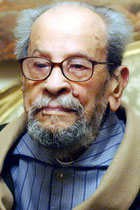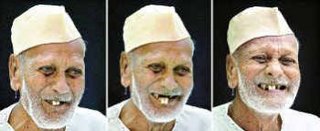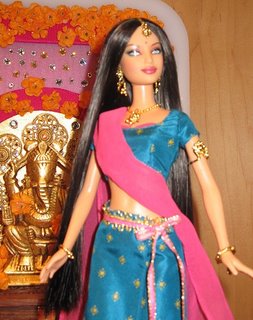NAGUIB MAHFOUZ

It was December of 1988, when I first heard of Naguib Mahfouz. Although by then he was a well established author in the Arab world with a fan following from Baghdad to Beirut, relatively few outside the Middle East had read his books. Much of his works had not been translated; of those that had been, few were available in India. It would be many years before I could lay my hands on any of his writings. When I finally could, I noticed that his most famous work, the Cairo Trilogy, was first translated into English around 1990 or so. Over the years, people like Edward Said did try to persuade publishers to put out translations but it took the Noble Prize of December 1988 to set those wheels in motion.
Yet I remember being touched by the text of his Nobel speech which was published by many leading Indian newspapers and magazines of the day. So that without having read a single piece of his writing I became somewhat of a fan of the man.And every time I remembered his evil is a loud and boisterous debaucherer, and that Man remembers what hurts more than what pleases, I couldn't help but marvel at the simple truth put in succinctly in those lines.
Cairo Trilogy took me several months to finish (and several years to get over, but that's another story) although it was the only book I was reading at the time. My progress was hindered by the fact that I would keep turning the pages back and re-reading the older sections. And no, this didn't arise from any confusion over the characters, or the generations or the events. Rather it felt more like savoring a delicious meal, where one's taste buds and thoughts might still dwell on the delicacies just ingested.
For instance, I would go over and over the descriptions of Amina's kitchen and the makings of the seasonal delights and sigh at the sheer magic of Mahfouz's words. Words that could transform the most dank and darkest of places in a 1920s Cairo household, the kitchen, into a life giving fountain of joy and pleasure, and make mundane tasks as kneading the dough, appear divine. As the coals and wood burned and glowed, you could scarcely pity Amina's stifled existence under the iron fisted patriarch. Despite all the indignities heaped on her, those "sweet compotes and doughnuts for Ramadan, the cakes and pastries for Id-ul-Fitr" as "the blaze of the fire gleamed from the depths of the oven through the arched opening like a flaming firebrand of joy in the secret recesses of the heart" made Amina's world a place of sheer beauty.
This is from the first part of the book called the Palace Walk (the other two are Palace of Desire and Sugar Street also called Al-Sukkariya in the original version). The trilogy spans three generations and covers a period from the end of World War I to the rise of Nasser and modern Egyptian nationalism in the mid-1940s. Mahfouz's women were made of stern stuff and almost always occupied centre stage. And they rebelled. In every generation, be it Amina or her daughters Aisha and Khadiga or eventually Susan Hammad. Against the system, against their circumstances; but their rebellion was quiet and non confrontational. Their gradual, non violent and perseverant struggle had the power to transform just as the slow flames in Amina's kitchen could change even the lowliest of grains to golden flat bread. This was the beauty of Mahfouz's world.
Details of Mahfouz's life and times have appeared in obits published in The Guardian, BBC and a host of other sites. (last link courtesy Pia)

It was December of 1988, when I first heard of Naguib Mahfouz. Although by then he was a well established author in the Arab world with a fan following from Baghdad to Beirut, relatively few outside the Middle East had read his books. Much of his works had not been translated; of those that had been, few were available in India. It would be many years before I could lay my hands on any of his writings. When I finally could, I noticed that his most famous work, the Cairo Trilogy, was first translated into English around 1990 or so. Over the years, people like Edward Said did try to persuade publishers to put out translations but it took the Noble Prize of December 1988 to set those wheels in motion.
Yet I remember being touched by the text of his Nobel speech which was published by many leading Indian newspapers and magazines of the day. So that without having read a single piece of his writing I became somewhat of a fan of the man.And every time I remembered his evil is a loud and boisterous debaucherer, and that Man remembers what hurts more than what pleases, I couldn't help but marvel at the simple truth put in succinctly in those lines.
Cairo Trilogy took me several months to finish (and several years to get over, but that's another story) although it was the only book I was reading at the time. My progress was hindered by the fact that I would keep turning the pages back and re-reading the older sections. And no, this didn't arise from any confusion over the characters, or the generations or the events. Rather it felt more like savoring a delicious meal, where one's taste buds and thoughts might still dwell on the delicacies just ingested.
For instance, I would go over and over the descriptions of Amina's kitchen and the makings of the seasonal delights and sigh at the sheer magic of Mahfouz's words. Words that could transform the most dank and darkest of places in a 1920s Cairo household, the kitchen, into a life giving fountain of joy and pleasure, and make mundane tasks as kneading the dough, appear divine. As the coals and wood burned and glowed, you could scarcely pity Amina's stifled existence under the iron fisted patriarch. Despite all the indignities heaped on her, those "sweet compotes and doughnuts for Ramadan, the cakes and pastries for Id-ul-Fitr" as "the blaze of the fire gleamed from the depths of the oven through the arched opening like a flaming firebrand of joy in the secret recesses of the heart" made Amina's world a place of sheer beauty.
This is from the first part of the book called the Palace Walk (the other two are Palace of Desire and Sugar Street also called Al-Sukkariya in the original version). The trilogy spans three generations and covers a period from the end of World War I to the rise of Nasser and modern Egyptian nationalism in the mid-1940s. Mahfouz's women were made of stern stuff and almost always occupied centre stage. And they rebelled. In every generation, be it Amina or her daughters Aisha and Khadiga or eventually Susan Hammad. Against the system, against their circumstances; but their rebellion was quiet and non confrontational. Their gradual, non violent and perseverant struggle had the power to transform just as the slow flames in Amina's kitchen could change even the lowliest of grains to golden flat bread. This was the beauty of Mahfouz's world.
Details of Mahfouz's life and times have appeared in obits published in The Guardian, BBC and a host of other sites. (last link courtesy Pia)



